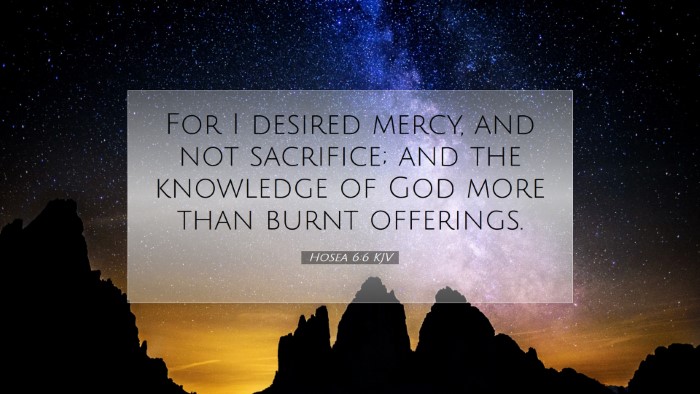Old Testament
Genesis Exodus Leviticus Numbers Deuteronomy Joshua Judges Ruth 1 Samuel 2 Samuel 1 Kings 2 Kings 1 Chronicles 2 Chronicles Ezra Nehemiah Esther Job Psalms Proverbs Ecclesiastes Song of Solomon Isaiah Jeremiah Lamentations Ezekiel Daniel Hosea Joel Amos Obadiah Jonah Micah Nahum Habakkuk Zephaniah Haggai Zechariah MalachiHosea 6:6
Hosea 6:6 KJV
For I desired mercy, and not sacrifice; and the knowledge of God more than burnt offerings.
Hosea 6:6 Bible Commentary
Commentary on Hosea 6:6
Verse (Hosea 6:6): "For I desire mercy, not sacrifice, and acknowledgment of God rather than burnt offerings."
Introduction
The verse Hosea 6:6 is a profound statement within the rich tapestry of the minor prophets, reflecting the heart of God towards His people. This text highlights the contrast between ritualistic worship and genuine spiritual relationship. Below, we will explore the insights gleaned from the public domain commentaries, particularly those by Matthew Henry, Albert Barnes, and Adam Clarke.
Meaning of the Verse
At its core, this verse articulates God’s desire for mercy and knowledge over the mere observance of religious rituals. It emphasizes that the true essence of faith is rooted in compassion and an authentic relationship with the divine.
Matthew Henry's Perspective
Matthew Henry elaborates on this verse by underscoring God’s preference for mercy and compassion over empty ritual. Henry argues that the Israelites were often caught in the cycle of sacrificial offerings while neglecting the more critical matters of kindness and social justice. He interprets mercy as a practical application of love towards both God and fellow humans, which should naturally flow from a heart that knows God.
Key Insights from Henry:
- Contrast of Sacrifice and Mercy: Henry posits that while sacrifices were instituted by God, the intention was never for them to replace a heartfelt relationship with Him.
- A Heart of Worship: True worship involves loving one another and acting justly, which is far more pleasing to God than mere rituals devoid of ethical substance.
- Recognition of God's Authority: Henry emphasizes that acknowledgment of God is paramount, underscoring an understanding of His character and will as foundational to true worship.
Albert Barnes' Commentary
Albert Barnes provides a historical and spiritual context, examining the nature of the offerings made by Israel and how these failed to reflect a true understanding of God’s commands. His commentary highlights that the Israelites had replaced the inward reality of faith with outward ritualism.
Significant Points from Barnes:
- The Purpose of Sacrifice: Barnes notes that sacrifices were intended to foster reconciliation with God, not as ends in themselves.
- Spiritual Ignorance: He comments on the spiritual ignorance of Israel, where they believed that the performance of rites could suffice in lieu of ethical living.
- Call to Authentic Relationship: Barnes emphasizes the importance of knowing God and living in accordance with His will, as true religion entails an active and living relationship with the Creator.
Adam Clarke's Insights
Adam Clarke, known for his keen theological insights, interprets this verse within the larger narrative of Israel's disobedience and God's enduring mercy. Clarke points out that this divine desire for mercy exposes the heart of God's covenant with His people.
Important Lessons from Clarke:
- The Historical Context: Clarke notes that this message comes during a time of national crisis for Israel, a reminder of their need for genuine repentance over superficial worship.
- Divine Compassion: He emphasizes that God's call for mercy reflects His character—gracious, patient, and loving, seeking a relationship with His people.
- Practice What You Preach: Clarke admonishes believers to ensure that their worship is accompanied by acts of mercy and a desire for justice in order to fulfill the true essence of God's commands.
Theological Reflections
The theological implications of Hosea 6:6 invite reflection on the nature of worship. This passage challenges contemporary believers to examine their practices, asking questions such as:
- Are we engaging in worship that is merely ritualistic, devoid of compassion?
- How can our understanding of God's mercy transform our interactions with others?
- What does it mean to acknowledge God authentically in the context of modern faith practices?
Practical Applications
For pastors, theologians, and students of the Bible, this verse serves as a call to action. Here are some practical applications derived from the insights of the commentaries:
- Promote Justice and Mercy: Church leaders should emphasize the importance of mercy and justice in their ministries, teaching congregants to live out their faith in practical, community-oriented ways.
- Integrate Knowledge and Worship: Encourage the integration of theological education with practical application; knowing God should lead to loving acts within the community.
- Foster Genuine Relationships: Create environments in the church where believers can share their struggles and be one another's supports, reflecting the mercy of God.
Conclusion
Hosea 6:6 transcends its historical context, offering a timeless reminder of God’s priorities: mercy over sacrifice, relationship over ritual. The insights from Matthew Henry, Albert Barnes, and Adam Clarke collectively reinvigorate our understanding of this verse, challenging us to return to a heart of authentic worship. As we seek to embody God’s mercy, let us strive to cultivate relationships marked by compassion, pursuing both knowledge of God and active love in our communities.


